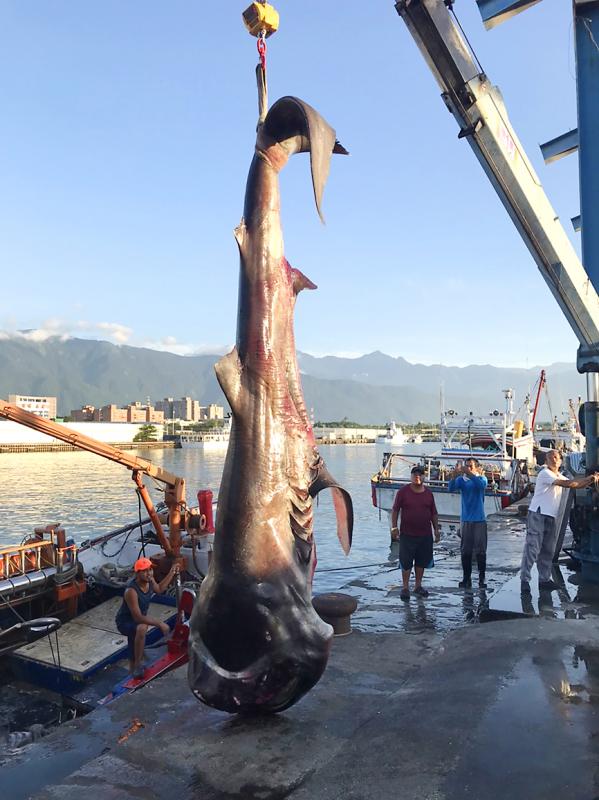A ban on fishing for great white sharks, megamouth sharks and basking sharks took effect on Tuesday as part of efforts to preserve biological diversity, the Council of Agriculture (COA) said on the same day.
The ban, which is applicable to all Taiwanese fishing vessels, regardless of where they operate, requires all vessels that inadvertently catch the sharks to release them back into the sea whether dead or alive, the council said in a press release.
Those who contravene the regulation would face a maximum three-year prison sentence and a fine of NT$150,000 in accordance with the Fisheries Act (漁業法), it said.

Photo courtesy of the Council of Agriculture’s Fisheries Agency
Vessels are obliged to report accidental catches of the sharks, including location and time of the catch, to local fisheries authorities within one day of returning to Taiwanese ports, the council said.
Non-compliance with the requirements would lead to fines from NT$30,000 to NT$150,000, it added.
Researchers who catch the sharks for scientific purposes would be exempt from the new rule, the council said.
Great white sharks and basking sharks are listed as a “vulnerable species” and an “endangered species” respectively by the International Union for Conservation of Nature.
Although megamouth sharks have since November 2018 been classified as of “least concern,” the organization suggested that Taiwan require its vessels to release accidentally caught megamouth sharks.
Taiwan in 2013 introduced requirements that catches of the three shark species be reported. At that time, such catches were legal, but vessels that were found to have failed to report them were fined NT$30,000 to NT$150,000.
A reported 34 great white sharks and 139 megamouth sharks have been caught by Taiwanese vessels since 2013.
The ban was applauded by the Taipei-based non-profit organization Environment and Animal Society of Taiwan (EAST), which has for years pushed for the protection of megamouth sharks.
EAST chief executive Shih Wu-hung (釋悟泓) said that the ban is an important decision to help preserve the shark population.
Saving megamouth sharks is of great urgency in the nation, as they between April and August migrate in the waters off Taiwan’s east coast.
Since the megamouth shark was discovered and named in 1976, only 226 of the species have been recorded around the world, with 146 of them caught off Taiwan, Shih said, adding that the government should add the species to a protected list.

A preclearance service to facilitate entry for people traveling to select airports in Japan would be available from Thursday next week to Feb. 25 at Taiwan Taoyuan International Airport, Taoyuan International Airport Corp (TIAC) said on Tuesday. The service was first made available to Taiwanese travelers throughout the winter vacation of 2024 and during the Lunar New Year holiday. In addition to flights to the Japanese cities of Hakodate, Asahikawa, Akita, Sendai, Niigata, Okayama, Takamatsu, Kumamoto and Kagoshima, the service would be available to travelers to Kobe and Oita. The service can be accessed by passengers of 15 flight routes operated by

GIVE AND TAKE: Blood demand continues to rise each year, while fewer young donors are available due to the nation’s falling birthrate, a doctor said Blood donors can redeem points earned from donations to obtain limited edition Formosan black bear travel mugs, the Kaohsiung Blood Center said yesterday, as it announced a goal of stocking 20,000 units of blood prior to the Lunar New Year. The last month of the lunar year is National Blood Donation Month, when local centers seek to stockpile blood for use during the Lunar New Year holiday. The blood demand in southern Taiwan — including Tainan and Kaohsiung, as well as Chiayi, Pingtung, Penghu and Taitung counties — is about 2,000 units per day, the center said. The donation campaign aims to boost

ENHANCING EFFICIENCY: The apron can accommodate 16 airplanes overnight at Taoyuan airport while work on the third runway continues, the transport minister said A new temporary overnight parking apron at Taiwan Taoyuan International Airport is to start operating on Friday next week to boost operational efficiency while the third runway is being constructed, the Ministry of Transportation and Communications said yesterday. The apron — one of the crucial projects in the construction of the third runway — can accommodate 16 aircraft overnight at the nation’s largest international airport, Minister of Transportation and Communications Chen Shih-kai (陳世凱) told reporters while inspecting the new facility yesterday morning. Aside from providing the airport operator with greater flexibility in aircraft parking during the third runway construction,

American climber Alex Honnold is to attempt a free climb of Taipei 101 today at 9am, with traffic closures around the skyscraper. To accommodate the climb attempt and filming, the Taipei Department of Transportation said traffic controls would be enforced around the Taipei 101 area. If weather conditions delay the climb, the restrictions would be pushed back to tomorrow. Traffic controls would be in place today from 7am to 11am around the Taipei 101 area, the department said. Songzhi Road would be fully closed in both directions between Songlian Road and Xinyi Road Sec 5, it said, adding that bidirectional traffic controls would